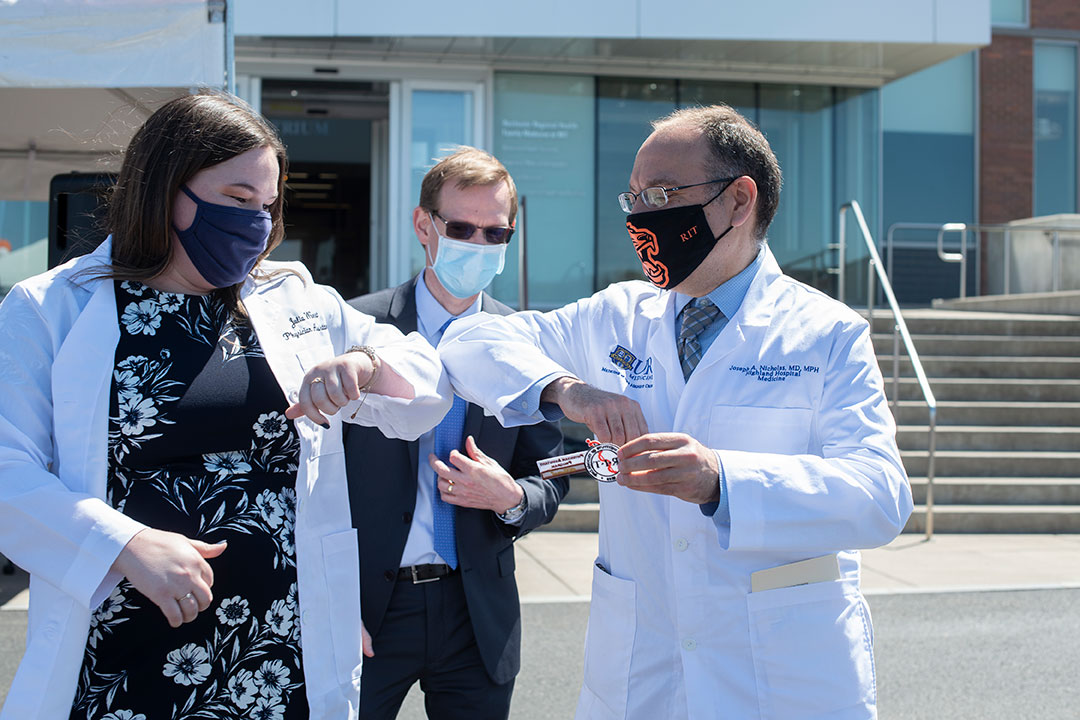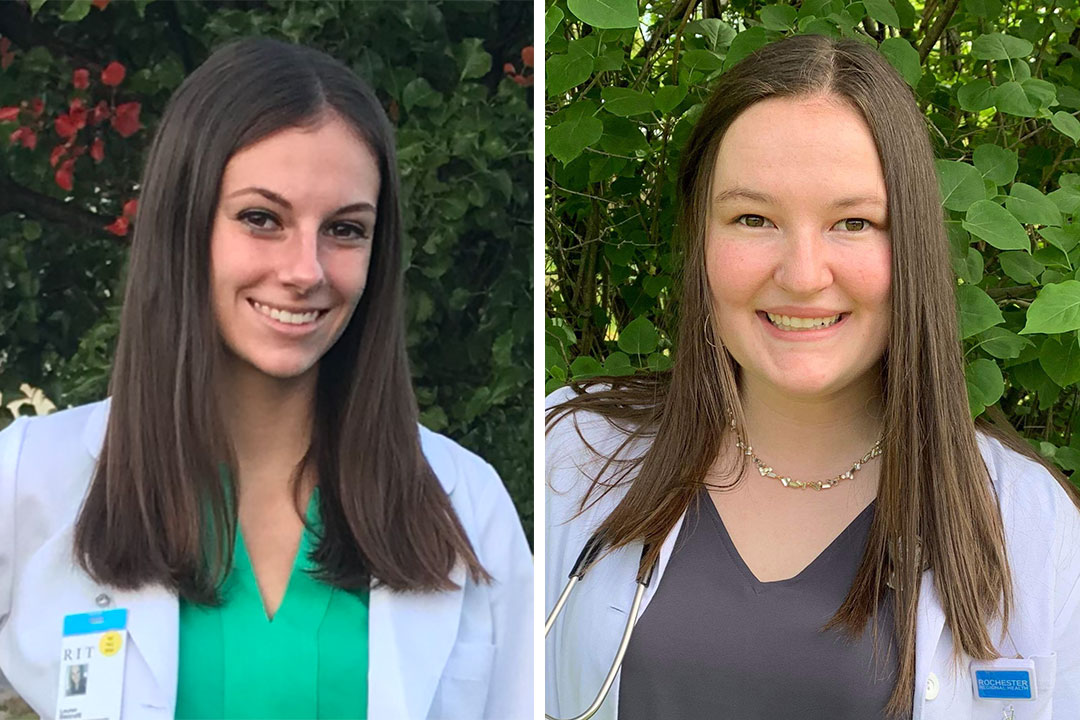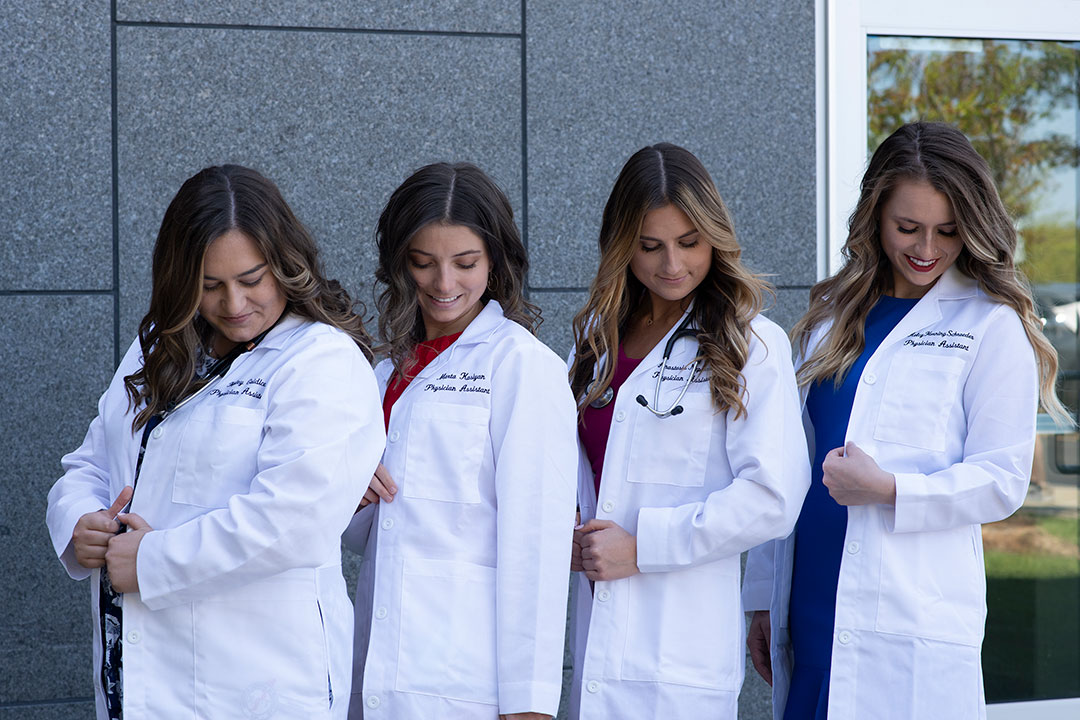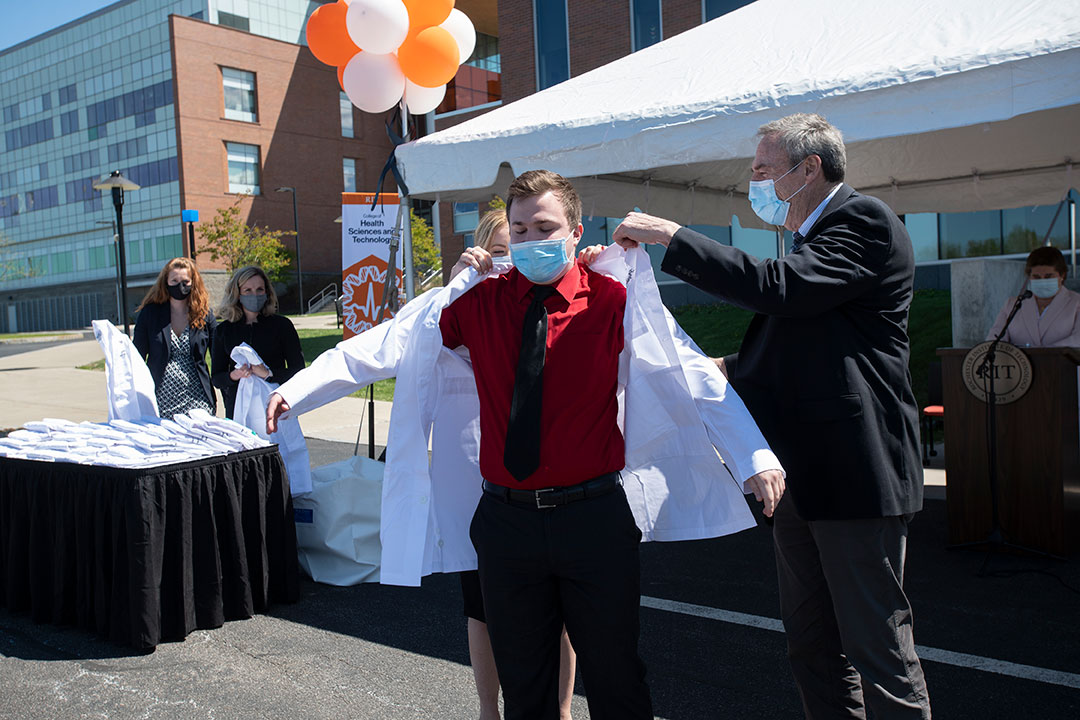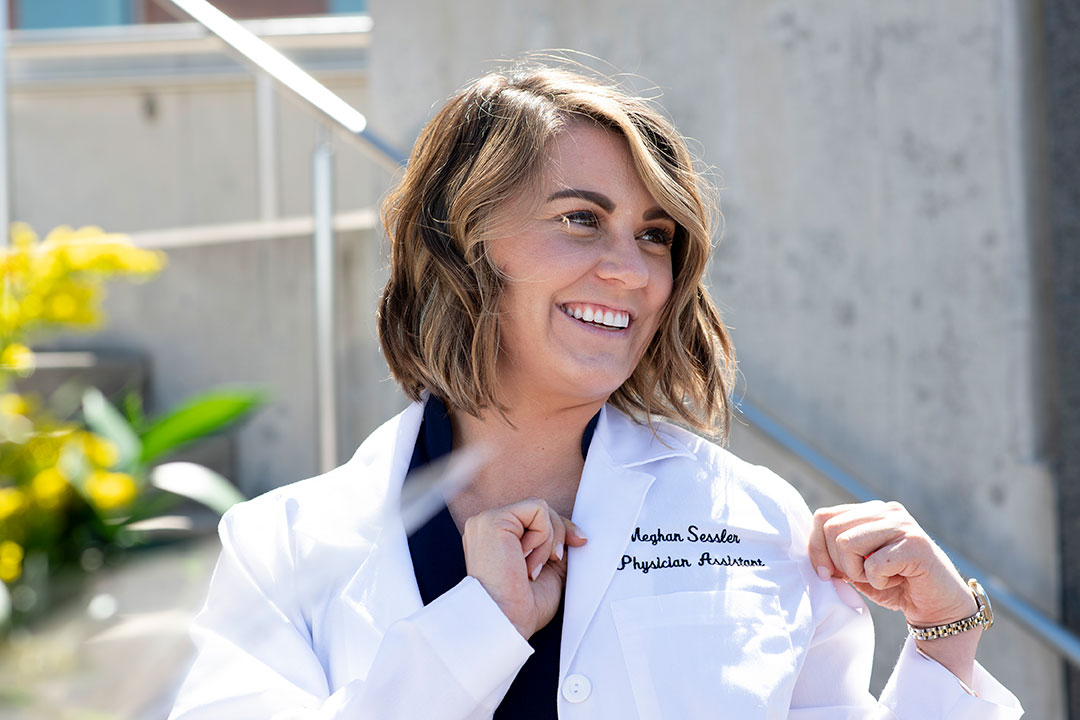RIT graduates prepare for careers in healthcare amidst pandemic
A. Sue Weisler
Julia Wuest, left, elbow-bumps Joseph Nicholas, instructional faculty and medical education consultant in the physician assistant program during the coating ceremony on May 13. RIT’s physician assistant professors present graduating students with a personalized, professional-length white coat. The symbolic event is a tradition in many professional health programs.
Graduates from the College of Health Sciences and Technology Lauren Bennett and Julia Wuest will soon enter the healthcare field at an unprecedented time.
Lauren Bennett, left, and Julia Wuest will soon enter the healthcare field at an unprecedented time.
Their commitment to helping people shaped their career choices independent of global health trends. Neither could have imagined beginning their careers as essential workers during a pandemic nor choosing a different occupation for themselves.
Wuest and Bennett are among nearly 60 students who will graduate this May from the college’s clinical programs—physician assistant BS/MS, diagnostic medical sonography BS, and the echocardiography (cardiac ultrasound) certificate program. These students spend the final year of their programs immersed in practical work experience at clinics and hospitals in the region.
“The job market for PAs has improved as compared to last year, as the clinical arenas are recovering financially,” said Heather Grotke, interim director of the physician assistant program and academic coordinator. “Most job offers have been local, including at both Rochester Regional Health and University of Rochester Medical Center.”
Likewise, the demand for diagnostic medical sonographers has rebounded from the first year of the pandemic and many students received job offers prior to graduation, added Hamad Ghazle, director of the diagnostic medical sonography program.
This economic upswing benefited Wuest and Bennett when their clinical rotations led to job offers.
Wuest, from Hilton, N.Y, will graduate with a BS/MS from the physician assistant program and join Rochester General Hospital’s general hematology and oncology department. Wuest, this year, won a $500 scholarship from the Rochester Regional Physician Assistant Association. She will use the award to cover her New York state license and registration fees.
Wuest credits her mentors at Rochester General Hospital hematology and oncology department for treating her like a peer and giving her confidence in her skills. Her experience with the general and malignant hematology teams over two rotations later led to a job offer. Wuest, in August, will start in general hematology and oncology, with the plan to transition working with the malignant hematology and bone transplant team. Her goal is to help people with leukemia and lymphoma.
“I’ve always been interested in oncology in general because I’ve had so many friends and family affected by cancer,” Wuest said. “You can never learn too much about it, and the medicine is always changing. I thought it was a perfect mix of my passions, my morals, and a quickly changing field.”
Bennett, a resident of Phelps, N.Y., will earn her BS in diagnostic medical sonography and begin her career as a member of the ultrasound team at Strong Memorial Hospital.
“My program director, Professor Hamad Ghazle, said to treat every single day of our rotation like a job interview, and that’s what I did,” Bennett said. “It’s been a dream of mine to work at Strong, but I never thought I would be able to this early in my career.”
Bennett will work with patients from the emergency room and the hospital’s in-patients, and she will join a supportive team of alumnae at the University of Rochester Medical Center’s ultrasound department that put her at ease at the beginning of her rotation.
“Everyone—all the clinical instructors and sonographers— I worked with graduated from RIT’s program,” Bennett said. “So, they know what it’s like to be on rotation because they’ve been in my shoes, and they were understanding.”
The state lockdown had postponed required competency exams and practice time in RIT’s ultrasound lab and delayed the cohort’s clinical experience.
“The complex challenges brought by the COVID pandemic has placed a tremendous burden on the students’ educational clinical experience,” Ghazle said. “The ultrasound program faculty developed contingency plans working with the university, state, clinical affiliates, and accreditation, and ultrasound professional organizations to return students to clinical rotations and to resume ‘hands-on’ experience in the on-campus ultrasound lab.”
Bennett enjoys the combination of scanning and patient interaction. “Ultrasound is not like other imaging modalities. With X-ray or MRI, you can’t be with the patients because of radiation. As a sonographer, I spend 45 minutes with the person, getting to know them and getting to know what’s going on.”
Because ultrasound imaging requires sonographers to stand near their patients, students wear a face mask, face shield, and gloves, and follow all the safety standards to protect themselves and others. Understanding the various COVID protocols from the first day of their practical experience gives new college graduates an advantage, Bennett said. “I started with these policies in effect, and I’ve been experiencing it for a year. So, I feel that I am going into the workforce knowing how to handle it.”
RIT’s ultrasound faculty will continue to “counsel, guide, and assist our students to navigate and overcome the challenges created by COVID-19 even after graduation,” Ghazle added.
People are drawn to healthcare despite the circumstances, Wuest noted. “I think pandemic or not, a good healthcare worker has signed up for it, and they are there to help people. I think the pandemic shows how the healthcare professions need to work together as a team to support each other because we all have the common goal of helping people and the community we live in.”
Wuest said her perception of being a physician assistant changed during the pandemic.
“There were no textbook answers on how to treat COVID, and so it really had to be individualized for each person and in each case,” Wuest said. “I saw that physician assistants were the biggest advocates for the patients’ wishes—and for making the care fit the patient, and not just fit the disease. That made me proud of the profession I am going in because PAs are there for the patients, which is what it should all be about.”
Coating Ceremony
On May 13, RIT’s physician assistant professors present graduating students with a personalized, professional-length white coat. The symbolic event is a tradition in many professional health programs.
A. Sue Weisler
Haley Guidice, left, Marta Kasiyan, Anastasia Nepokroeff, and Kelcy Horning Schroeder check out their new coats.
A. Sue Weisler
Armand “AJ” Florio receives his white coat.
A. Sue Weisler
Meghan Sessler shows off her personalized white coat.





